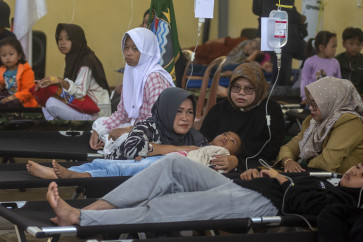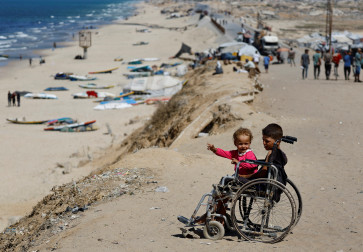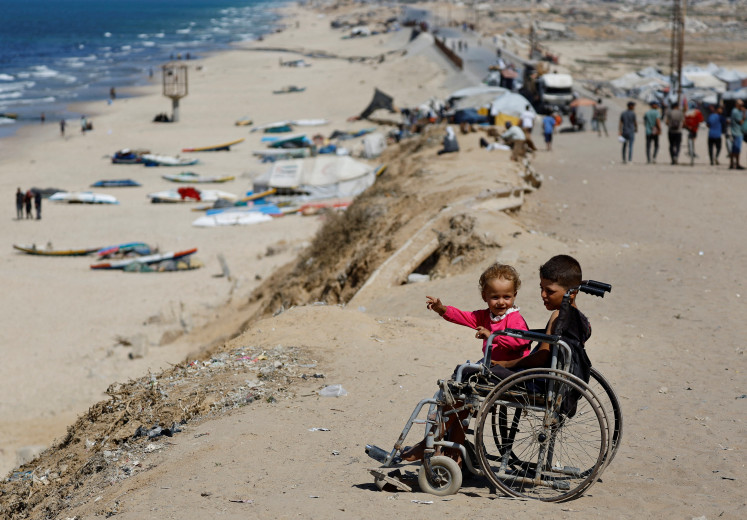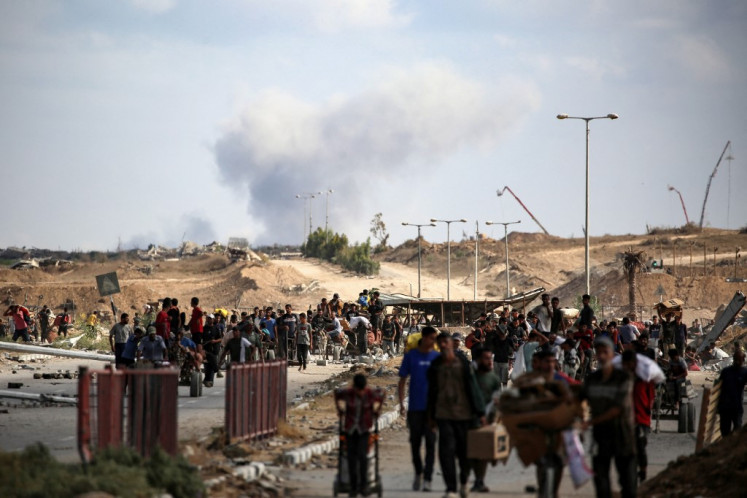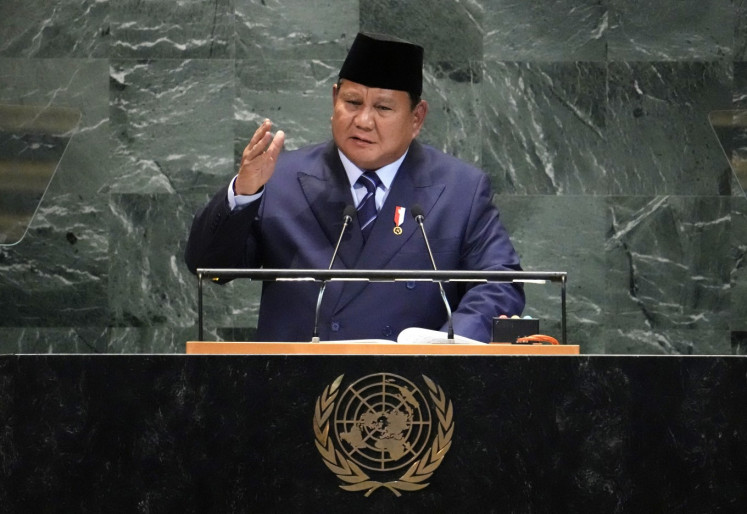Popular Reads
Top Results
Can't find what you're looking for?
View all search resultsPopular Reads
Top Results
Can't find what you're looking for?
View all search resultsView Point: Time to market the soccer culture
A nation with a population of 245 million, the fourth-largest in the world, Indonesia currently ranks a lowly 157 in the latest FIFA standings, far below even the âweakestâ finalist of the World Cup now underway in Brazil
Change text size
Gift Premium Articles
to Anyone
A
nation with a population of 245 million, the fourth-largest in the world, Indonesia currently ranks a lowly 157 in the latest FIFA standings, far below even the 'weakest' finalist of the World Cup now underway in Brazil.
The history of the World Cup, however, should not dismiss the role of Indonesia, a nobody on the soccer stage today but a country that aspires to co-host the quadrennial competition along with ASEAN neighbors in 2034.
When it was still a colony called the Dutch East Indies, Indonesia rode its luck to qualify for the third World Cup in France, substituting for Japan, which had pulled out due to a war with China. The Dutch East Indies should have met the United States in a play-off for a ticket to France, but the Americans withdrew due to financial constraints.
Only a few native Indonesians, including Mo Heng, team captain Achmad Nawir and Suwarte Soedarmadji, were included in the Dutch East Indies team that competed in France. The squad played its first and only game in the World Cup after a 6-0 drubbing by eventual runner-up Hungary in the first match of the first round. About 9,000 people watched the one-sided match at the Velodrome Municipale in Reims on June 5, 1938.
The Asian team's master, the Netherlands, performed no better, losing to Czechoslovakia 0-3.
From European standards, nothing was special about the first Asian team to have qualified for the World Cup. Local media described the team as a group of dwarfs, perhaps because most of them only stood around 160 centimeters tall, who played the towering Hungarians. The final score reveals the wide gap, but still one of the Hungarian players, Gyorgy Sarosi, who scored twice, showed his respect for the opposition, recalling the match as a 'quite difficult game'.
On the geschiedenis24.nl history portal, Dutch journalist CJ Goorhoff, who covered the match, quoted Sarosi as saying that he did not expect the Dutch East Indies players to fight it out and spring some surprises.
Nobody would doubt the quality of native Indonesian players, whose All-Indonesia Soccer Association (PSSI) ' as it was then called ' boycotted the Dutch East Indies' appearance in the World Cup after the FIFA-sanctioned association, the Dutch East Indies Soccer Association (NIVU), monopolized the selection of players. The PSSI team rose to prominence after holding a Chinese team to a 2-2 draw in 1937.
Many speculated that had more native Indonesians been included in the World Cup team, the story would have been very different for the Dutch East Indies' campaign in France.
In fact, an independent Indonesia has never fallen short of talent that has shocked the major powers in soccer. The Olympic Games in Melbourne, Australia, in 1956 saw Indonesia draw with the favorite, the Soviet Union, in the quarterfinals, before eventually losing 0-4 in the rematch.
In the 1950s, Indonesia joined the ranks of elite Asian soccer teams, reaching the semifinals of the Asian Games twice: in Manila in 1954 and Tokyo in 1958.
At least until 1991, Indonesia could pride itself as being one of the most feared soccer teams in the region. The Southeast Asian (SEA) Games gold medal, which Indonesia won that year, was the last international laurels for the nation. So long had Indonesia endured a title drought that the ASEAN Soccer Cup for under-17 teams created national euphoria last year.
There are always reasons to remain upbeat about the prospects of the national soccer team. The fact that Indonesia was the first Asian team to compete in the World Cup and that the PSSI (now called the Indonesian Soccer Association) is one of the oldest soccer associations in the region, show that soccer has long been part of the deep-rooted culture of the nation.
Kids from every corner of the archipelago play soccer, but not necessarily on a soccer pitch. They can easily transform a street into a pitch, albeit without grass. If a survey was conducted to find out which sport every Indonesian male played in their childhood, about 80 percent or more would say soccer.
Elementary school students easily memorize which soccer players from which countries play for which English Premier League, Italian Serie A or Spanish Liga BBVA teams. They easily become embroiled in arguments about who is the best player of a given year.
But how many of them will devote themselves to soccer? Almost every child wants to become a doctor, engineer or soldier when their teachers ask them their dreams on their first day of school. Even if when they grow up they still have an interest in soccer, very few will have the courage or commitment to try to follow in the footsteps of their soccer idols.
Portugal's Christiano Ronaldo was valued at £80 million when he moved to Real Madrid in 2009, before Wales' Gareth Bale set a new record of £83 million last year. The two players earn around £300,000 a week.
These fantastic figures seem unrealistic here, but the lucrative soccer industry in Europe has taught Indonesia the lesson that to develop the sport to the highest level, business is key. Many talents from slum areas in South America and Africa have gone on to shine in Europe under the market mechanism.
Everybody is happy with it. The players become rich and pay tax to the host countries; their clubs win trophies, and their national teams grow in strength and qualify for the World Cup.
Indonesia's professional soccer league may need a different approach in terms of organization, where the governing body, the PSSI, focuses on setting up and enforcing the rules. The PSSI should restrict its job to generating and scouting talent and let the market handle the rest.
Too many talented players have gone unnoticed and so much time has been wasted under the current soccer regime. Do any of the presidential and vice-presidential candidates contesting the July 9 election really care?
The author is a staff writer at The Jakarta Post.



